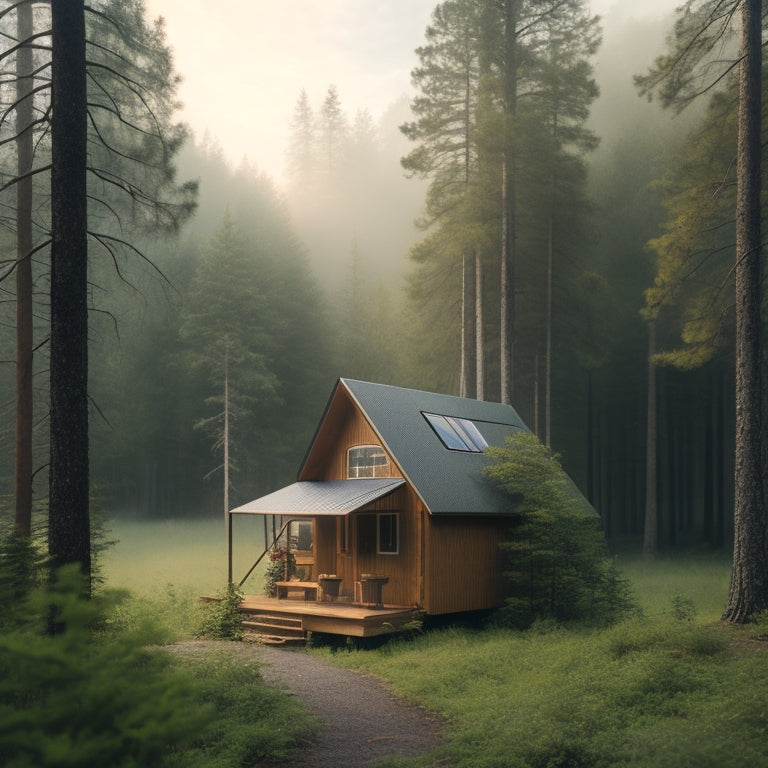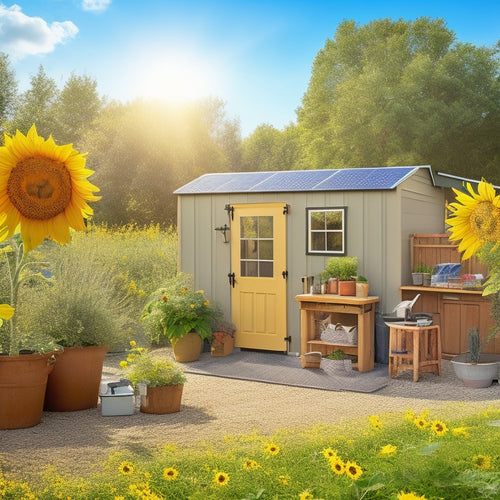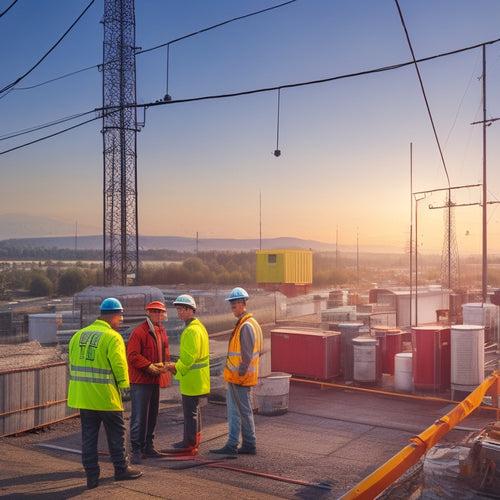
Cabin Renewable Energy Made Easy: A Step-by-Step Guide
Share
You're looking to install a cabin renewable energy system, and you want to do it right. First, assess your energy needs by calculating daily requirements, conducting an energy audit, and listing appliances. Next, select the right solar panels, considering efficiency, durability, and guarantees. Choose a reliable battery system, considering energy requirements and depth of discharge. When buying solar panel kits online, verify certifications and compliance. Finally, optimize system performance by monitoring energy usage patterns and adjusting habits. By following these steps, you'll be well on your way to energy independence - and there's still more to explore to maximize your off-grid potential.
Key Takeaways
• Assess energy needs by calculating daily requirements, conducting an energy audit, and listing appliances, lighting, and heating/cooling systems.
• Choose solar panels based on efficiency, durability, and guarantees, and ensure proper installation for peak energy production.
• Select reliable battery systems considering energy requirements, depth of discharge, and cycle life, and monitor battery health regularly.
• Establish routine system checks, implement energy-efficient practices, and avoid common pitfalls like over-discharging and uneven cell charging.
• Analyze energy usage patterns, adjust habits to reduce waste, and make data-driven decisions to optimize system performance and maximize energy independence.
Assessing Your Energy Needs
To determine the feasibility of a cabin renewable energy system, you need to calculate your daily energy requirements in watt-hours (Wh) by accounting for the power consumption of all your appliances, lighting, and heating and cooling systems. This process is called an energy audit, and it's important to get it right to make sure your renewable energy system meets your energy needs.
Start by making a list of all your appliances, including their wattage ratings and the number of hours you use them daily. Don't forget to include lighting, refrigeration, and heating and cooling systems.
Next, calculate the total daily energy consumption in watt-hours (Wh) by multiplying the wattage rating of each appliance by the number of hours used daily. This is called a load calculation.
Choosing the Right Solar Panels
With your energy needs assessed, you're ready to select the right solar panels to meet those needs. Choosing the right solar panels can be overwhelming, but by considering a few key factors, you'll be well on your way to harnessing the power of the sun.
Here are some essential considerations to keep in mind:
-
Panel Efficiency: Look for panels with high efficiency ratings (measured in watts per square meter) to maximize energy production.
-
Panel Guarantees: Make sure the manufacturer offers a thorough warranty (25 years or more) to protect your investment.
-
Seasonal Adjustments: Consider panels with adjustable tilt and orientation to optimize energy production during seasonal changes.
- Durability: Choose panels with durable materials and a proven track record of withstanding harsh weather conditions.
Selecting the Ideal Battery System
You'll need a reliable battery system to store the excess energy generated by your solar panels, and selecting the right one depends on several key factors.
When choosing a battery system, consider your energy requirements, the depth of discharge (DOD), and the number of cycles you expect the battery to last. Proper Battery Sizing is vital to guarantee your system can handle the energy demands of your cabin.
A deep cycle battery, designed for Deep Cycling, is ideal for off-grid systems as it can handle frequent charging and discharging.
When selecting a battery, look for ones with a high cycle life, usually above 2,000 cycles, and a DOD of at least 50%. This ensures your battery can handle the daily charge and discharge cycles.
Additionally, consider the type of battery technology, such as lead-acid, lithium-ion, or nickel-cadmium, as each has its pros and cons.
Buying Solar Panel Kits Online
Purchasing a solar panel kit online can be a convenient and cost-effective way to get started with your cabin's renewable energy system, as long as you do your research and choose a reputable supplier. You'll want to carefully review online reviews from multiple sources to make certain you're buying from a trustworthy company. Be sure to check the reviews for comments on shipping times, packaging, and customer service, as these can be crucial factors in getting your system up and running smoothly.
When buying online, consider the following key factors:
-
Warranty and support: Look for suppliers that offer extensive warranties and dedicated customer support in case you encounter any issues with your system.
-
Shipping considerations: Make sure to factor in shipping costs and times when calculating the overall cost of your system.
-
Certifications and compliance: Verify that the solar panel kit meets local building codes and certifications, such as UL or ETL.
- Compatibility and customization: Ensure the kit is compatible with your cabin's energy needs and can be tailored to meet your specific requirements.
Installation and Maintenance Tips
As you prepare to install your renewable energy system, it's crucial to take into account a few critical factors to guarantee peak performance.
You'll want to carefully select a site that maximizes energy production, implement energy-efficient practices, and establish a routine for regular system checks to prevent issues.
Site Selection Essentials
To guarantee a successful cabin renewable energy system, it's crucial to select a site that maximizes energy production and minimizes maintenance costs. You want to make certain that your system operates efficiently, and that means choosing a location that's ideal for energy generation.
When selecting a site, consider the following key factors:
-
Land topology: Look for flat or slightly sloping land to make sure that your renewable energy system can be installed securely and efficiently.
-
Climate analysis: Assess the local climate to determine the best type of renewable energy system for your cabin. For example, if you're in a sunny area, solar power might be the way to go.
-
Shading and obstruction: Verify that your system won't be shaded or obstructed by trees, buildings, or other structures, which can reduce energy production.
- Accessibility and maintenance: Choose a site that allows for easy access and maintenance, reducing the risk of damage and minimizing maintenance costs.
Energy Efficiency Tips
By implementing a few essential energy efficiency tips during the installation and maintenance of your cabin's renewable energy system, you'll be able to maximize its performance and extend its lifespan.
One vital step is to conduct an energy audit to identify areas of energy inefficiency in your cabin. This will help you pinpoint where energy is being wasted and take corrective measures to optimize energy usage.
Another key tip is to use smart plugs to monitor and control energy consumption of individual appliances. These plugs can provide real-time energy usage data, allowing you to identify energy-hungry devices and take corrective action.
Additionally, consider installing energy-efficient appliances and lighting to reduce overall energy consumption. Properly insulating your cabin and sealing air leaks can also help reduce heat loss and energy waste.
Regular System Checks
You'll need to conduct regular system checks to make sure your cabin's renewable energy system operates at peak performance, identifying potential issues before they become major problems. Regular checks will help prevent unexpected downtime, maintain peak energy production, and reduce the risk of costly repairs.
To guarantee your system runs smoothly, schedule regular maintenance checks. This includes:
-
Inspecting electrical connections and cables for signs of wear or damage
-
Monitoring system performance to identify trends and anomalies
-
Cleaning solar panels and wind turbines to maintain efficiency
- Reviewing system logs to identify potential issues before they become major problems
Monitoring Your Off-Grid System
As you manage your off-grid system, you'll want to keep a close eye on its performance to make sure it's running efficiently and effectively.
You'll need to track your system's energy production and consumption patterns to identify areas for improvement.
System Performance Tracking
Monitoring your off-grid system's performance is essential to ensuring it operates efficiently and effectively, allowing you to identify potential issues before they become major problems. This is where system performance tracking comes in – an important step in maintaining your cabin's renewable energy system.
By tracking your system's performance, you'll be able to identify areas of improvement, optimize energy production, and prevent costly repairs.
Here are some key benefits of system performance tracking:
-
Data-driven insights: Get a clear picture of your energy production and consumption patterns with data analytics, enabling you to make informed decisions about your energy usage.
-
Optimize performance: Use performance metrics to identify areas of improvement, ensuring your system operates at peak efficiency.
-
Early issue detection: Catch potential problems before they become major issues, reducing downtime and costly repairs.
- Maximize energy independence: With a well-performing system, you'll be able to enjoy the freedom and independence that comes with relying on renewable energy.
Energy Usage Patterns
By analyzing your energy usage patterns, you can pinpoint periods of high energy consumption and identify opportunities to optimize your off-grid system's performance. Understanding your energy habits is essential to ensuring your system operates efficiently.
You'll want to monitor your energy usage to identify patterns and trends, such as peak hours, seasonal fluctuations, and appliance-specific energy draws. This insight will help you adjust your energy habits, reducing waste and maximizing your system's output.
For instance, you might discover that your energy consumption spikes during winter months when heating requirements increase. Knowing this, you can adjust your energy usage accordingly, perhaps by using energy-efficient heating alternatives or reducing overall energy consumption during peak hours.
Additionally, monitoring your energy usage patterns will help you identify opportunities to upgrade or replace inefficient appliances, further optimizing your system's performance. By staying on top of your energy usage patterns, you'll be able to make data-driven decisions, ensuring your off-grid system runs smoothly and efficiently.
Battery Health Monitoring
You'll need to keep a close eye on your battery's state of charge, depth of discharge, and overall health to guarantee your off-grid system operates reliably. Monitoring your battery's health is important to secure top performance, extend its lifespan, and prevent unexpected downtime.
A well-maintained battery bank can provide years of reliable service, but neglecting regular monitoring can lead to premature failure.
To avoid common pitfalls, remember:
-
Cell Balancing: Ensure all cells are evenly charged and discharged to prevent individual cell damage.
-
Battery Lifespan: Regularly inspect your batteries for signs of wear, such as corrosion or swelling.
-
Depth of Discharge: Avoid over-discharging, as this can greatly reduce your battery's lifespan.
- State of Charge: Keep track of your battery's state of charge to make sure you're not over-relying on your generator or grid connection.
Frequently Asked Questions
Can I Use My Existing Electrical Panel With a Solar System?
You'll likely need a panel upgrade to confirm that your existing electrical panel can handle the solar system's backfeed; schedule an electrical inspection to determine if your panel can support the added power.
Are There Any Government Incentives for Off-Grid Energy Systems?
As you begin your off-grid energy journey, you'll find a pot of gold at the end of the renewable energy rainbow: government incentives. You'll qualify for federal Tax Credits and State Rebates, shining a bright light on your path to energy independence.
How Do I Protect My Solar Panels From Wildlife Damage?
You'll want to safeguard your solar panels from wildlife damage by installing Animal Deterrents, such as electric fencing or motion-activated sprinklers, and consider adding Panel Guards, protective covers that shield your panels from curious critters.
Can I Add More Solar Panels to My System Later?
You can easily expand your system later by adding more panels, a process known as System Expansion, or upgrade individual panels for improved efficiency, a convenient option for future Panel Upgrades.
Do I Need a Backup Generator With My Solar Power System?
'Absence of evidence is not evidence of absence,' so don't assume grid reliability means no power outages. You'll want a backup generator to guarantee consistent energy supply, especially during prolonged outages, to keep your cabin lights on and appliances running smoothly.
Related Posts
-

Building an Emergency Backup Solar Power System in 5 Essential Steps
Building an emergency backup solar power system involves five key steps. First, assess your daily energy needs to ide...
-

Smart Grid Technology Implementation Challenges
You'll encounter several challenges when implementing smart grid technology, particularly in cost management, scalabi...
-

Top Solar Powered Camping Fans for Camping Enthusiasts
If you're a camping enthusiast, a solar-powered fan can be a transformative element for your outdoor experience. Thes...


